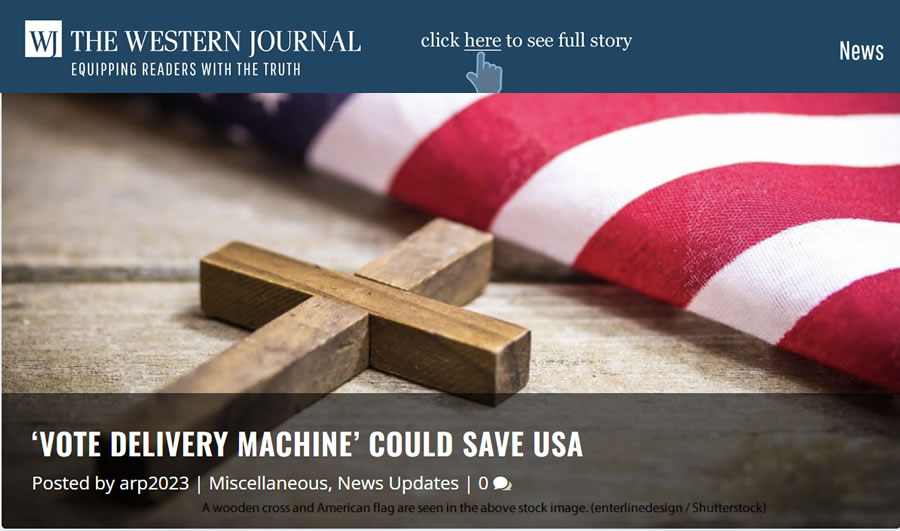

National Review’s editor and political pundit Ramesh Ponnuru [born 1974] wrote last week, “Many Republicans, including Trump himself, blamed the unpopularity of the pro-life movement for the party’s unexpectedly disappointing performance in the 2022 midterms. Even some pro-lifers have come to accept the conventional wisdom that opposition to abortion is a losing cause.
“They barely registered a protest when President-elect Donald Trump watered down the Republican Party’s platform language on abortion and criticized some states for restricting the procedure too heavily.”1
Ponnuru’s analysis strikes one as politically naive, somewhat analogous to market research firms who specialize in collecting, analyzing, and interpreting data, and then blithely listing the lack of power, vigor, and vitality of Christian conservatives. With minimal understanding of the denominations of political currency, such data serve as thermometers rather than thermostats of culture.
We pointed out on May 7, 2022, two months before Dobbs vs. Jackson, that SCOTUS’ potential overturn of the fatally flawed 1973 Roe v. Wade landmark decision, should cause Evangelicals to pause and think through what’s coming soon to their surroundings and prospects.
“Specifically,” we wrote, “with the U.S. Supreme Court looking as if it may overturn Roe vs. Wade in the Dobbs vs. Jackson case, tremendous pressure is about to be applied to state legislators and courts.
“The battle then, over snuffing out the lives of children in utero, will move from the Judiciary to the Legislative Branch of government, hence to a place where grassroots, precinct-level organizing determines success or failure. Christians will have to take their civics game therefore to a whole other level.”2
What has transpired since the Dobbs vs. Jackson decision has been largely a failure on the side of Evangelical and Pro-life Catholic Christians and their limited knowledge of grassroots, precinct-level organizing, which amounts to informed involvement in helping to elect those who preserve our freedom and liberty.
The largest denominations of political currency are: 1) How many votes can you bring to the table, 2) How much money can you bring that brings votes to the table? For many Evangelical leaders, mobilizing is merely creating an opportunity for them to speak … which is not a denomination of political currency.
So let’s talk about abortion: over the last 50 years, a comfortable and cushy cottage industry has been created for Pro-life organizations. Some rake in $10M to $15M annually, as they focus largely on glitzy galas and omnipresent fundraising requests, which masks their ineptitude at grassroots precinct-level organizing.
Something similar might happen during President Donald Trump’s new term. His campaign commitment made to Evangelical and Pro-life Catholic Christians is to shut down the neo-pagan U.S. Department of Education and move public education back to the States … closest to the people. Which is genius!
Closing the Department of Education and returning control of education to the states creates a radical decentralization of authority over education, improving educational outcomes by tailoring policies to local communities. The outcome would reinvigorate innovation, competition, and accountability, helping to better prepare, launch, and advantage America’s youth into the future.
However, what we soon might see – much like the Pro-life referendums since Dodds vs. Jackson – is the tiny stick that we Evangelicals and Pro-life Catholics swing towards elected officials, whose only fear consists of losing their political perch. Seventy-five percent of Christians not voting on Election Day doesn’t pose much of a threat to politicians.
On the opposite side we find the National Education Association [NEA], the largest labor union in the United States, representing millions of teachers, education professionals, and support staff … and heavily involved in political advocacy, lobbying for education funding and progressive social policies. Being directly aligned with the Democratic Party, the NEA spends significant resources on elections, both endorsing and financially supporting candidates who align with its progressive, liberal social beliefs and agenda.
Former Ohio Congressman Bob McEwen’s talk at a pastor’s conference in 2016 helps explain the matter at hand:
“An airline passenger turns to her seat-mate and asks, ‘What do you do?’ He replies, ‘I’m a pastor.’ She responds, ‘Oh, that’s wonderful! I think that spirituality is essential; I don’t care which religion it is, because they all lead to God. My son does something with crystals out in Sedona, and it seems to help him. I appreciate what you do!’
“Now, she thinks she has just paid the minister a compliment. However, she has just demonstrated that she doesn’t have a clue what she’s talking about with respect to Biblical faith and the true Living God.
“The pastor then turns to his other seat-mate and asks, ‘What is it that you do?’ He answers, ‘I am a Member of Congress.’ The pastor responds, ‘That is terrific! I so respect people in public life. It is a great thing that you do; I don’t care which political party you choose because there are good people on both sides. They are all trying to do what is best.’
“Now, the minister thinks he has just paid the Congressman a compliment. However, he has just demonstrated that he doesn’t have a clue about how politics and government work [not to mention the battle for control of resources and ideological supremacy].”
With that said, Maggie Haberman moderated The New York Times post-election summit last week. Participants included Kellyanne Conway, Anita Dunn, Major Garrett, Margaret Hoover, Alexis McGill Johnson, Van Jones, Jonathan Karl, Sarah Longwell, Kevin McCarthy, and Jason Miller.
Kellyanne Conway said that part of the reason that President Biden could not step aside is people didn’t have confidence in the competence of Kamala Harris. We were prodded by Main Street Media to believe that the Vice-President was a leader and well-spoken. The American people saw it differently. Conway said:
“Very few lessons have been learned by my democratic colleagues. The fact is this, it’s still January 6, 2021, [on their] calendar. [Democrats] get an electric vehicle [on their way to] get an abortion: [To decipher] You’re out of touch with the public. This election was a rejection of wokeness.”
Kellyanne Conway’s remarks are worth the 5 minutes:
x.com/ericabbenante/status/1867012512337571863?s=42
Gideons and Rahabs have entered the public square.
David Lane
American Renewal Project
1. www.washingtonpost.com/opinions/2024/12/10/abortion-rfk-republican-party-cabinet/
2. myemail.constantcontact.com/-The-current-system-is-broken–.html?soid=1106253726374&aid=JTIUoJeZo2Qtorical-precedent-and-possible-harbinger/
















